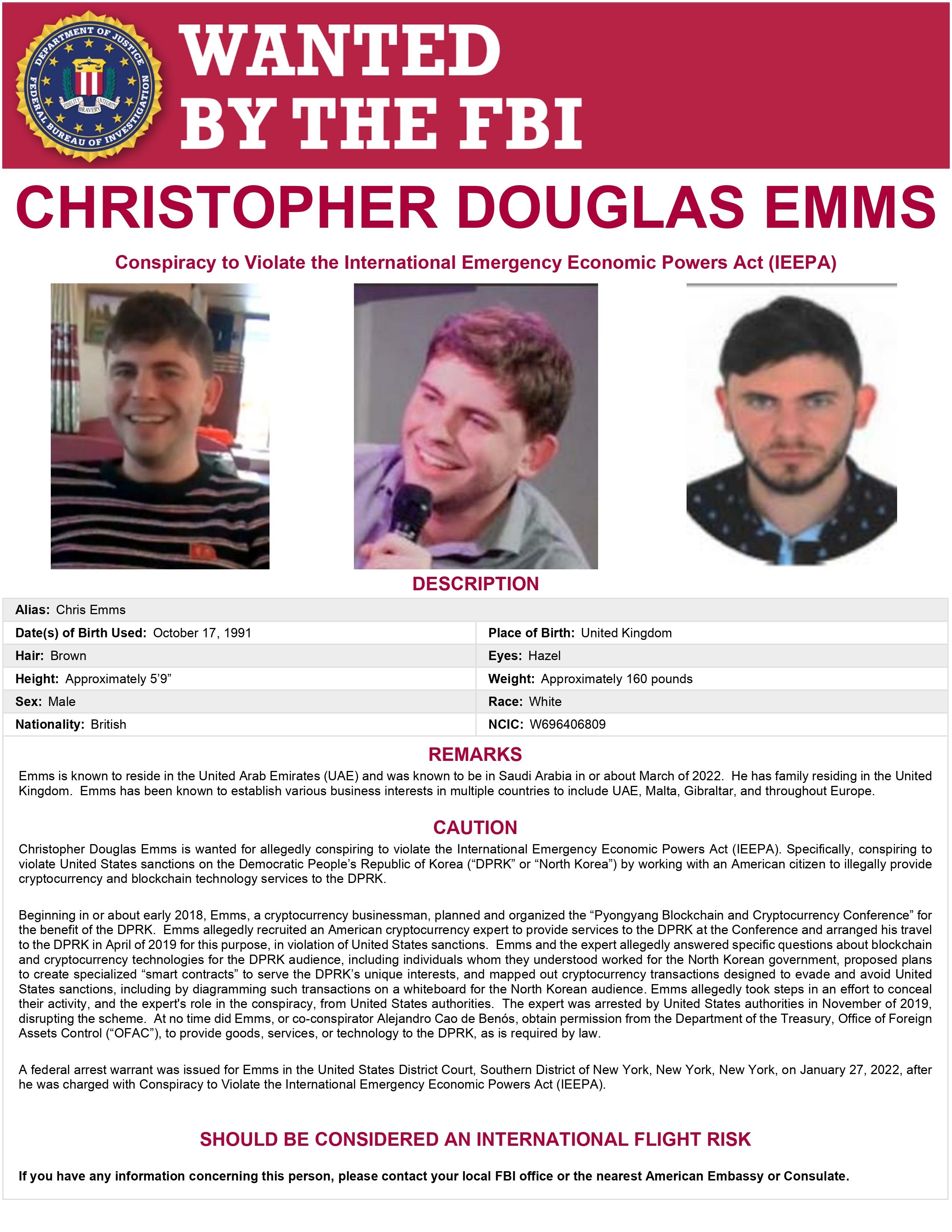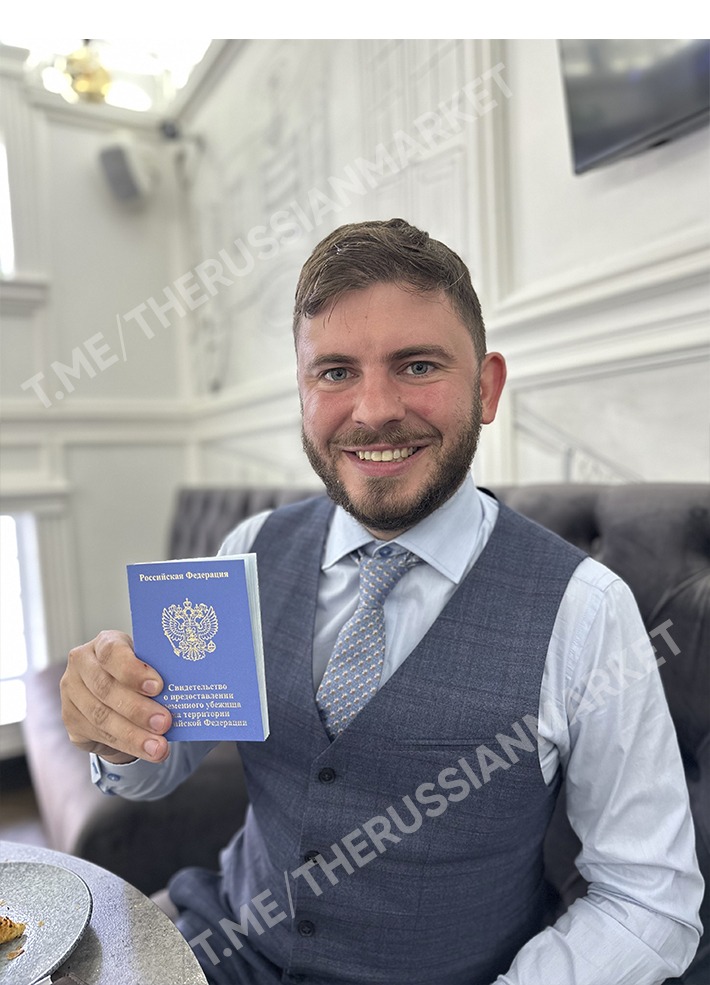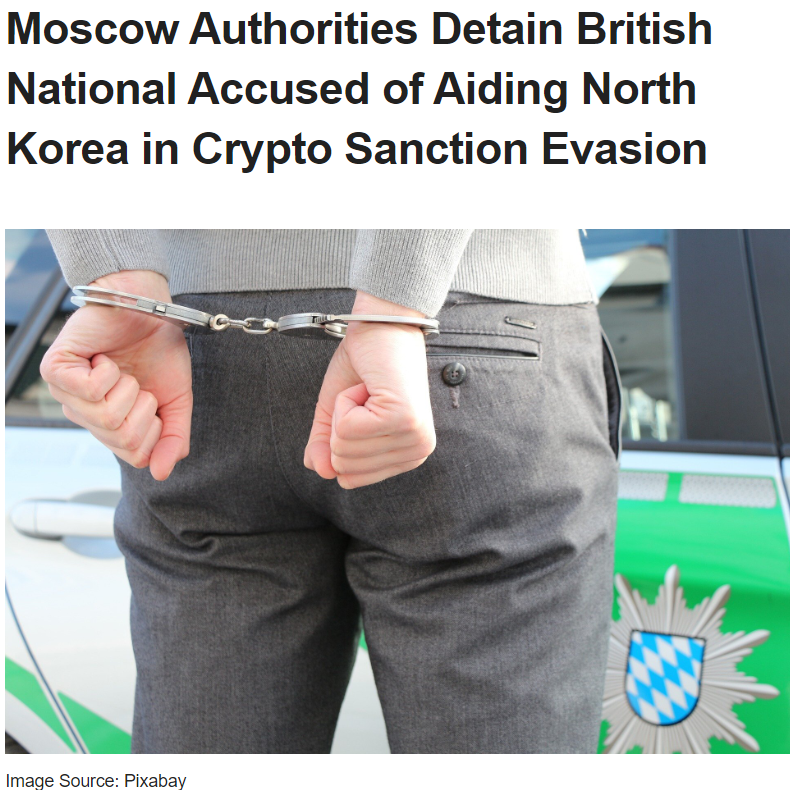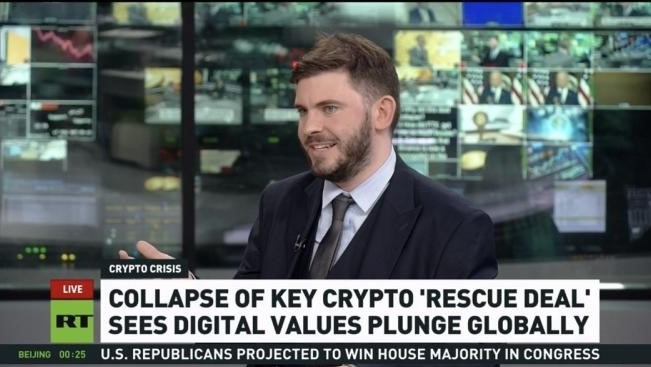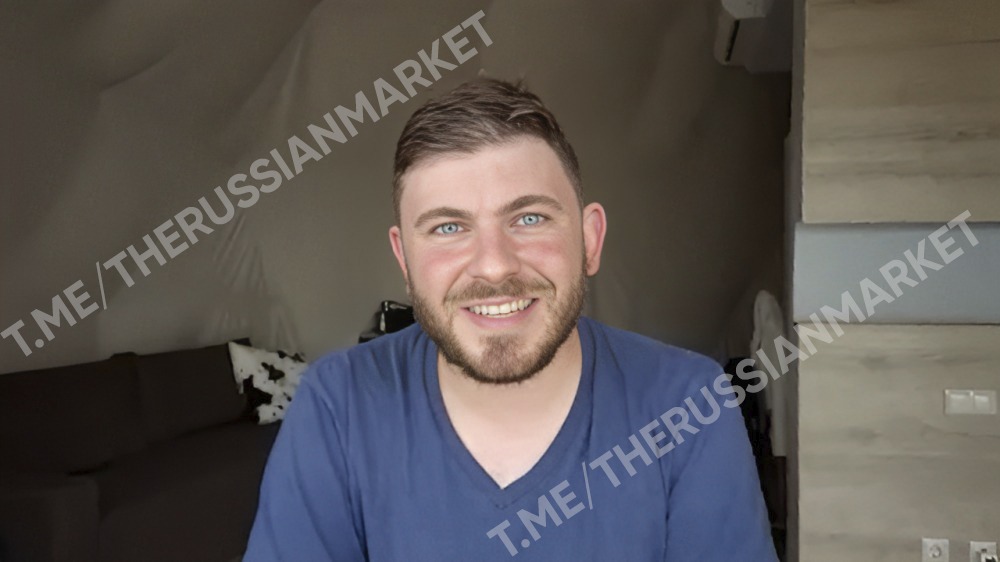The saga of a British crypto guy - from North Korea to Russia through FBI and Saudi jail
The Russian Market
June 19, 2023
In February, media outlets published the news like:
British citizen who helped North Korea evade US sanctions via crypto arrested in Moscow. That Brit was a crypto entrepreneur Chris Emms, and if you google this name, the first link you see would be the FBI.
Source: fbi.gov
Well, we do have information about this person if the FBI wants it.
In fact,
Emms was never arrested in Russia, on the contrary, he has been recently granted
political asylum. And this is why he is now ready to openly talk about his case.
Chris was contacted by the
Russian Market and gave an exclusive online interview detailing his experiences over the past four years. His story reads like a Hollywood script, featuring
crypto,
British diplomats,
North Korea, the
FBI,
Saudi prison, and ultimately ending up in
Russia.
How to get wanted by the FBI
Chris Emms was invited via LinkedIn to participate in a cryptocurrency conference held in
Pyongyang, North Korea, back in
2019. He accepted it.
Back then, in that time in crypto, things were very different than they were now. So everyone was having different wild and weird adventures. And I thought, wow, that's quite an interesting adventure to have. I'll go along and I'll go and attend. So that was basically it. It was an invitation that I accepted.
In terms of what you would consider a conference, it wasn't a conference at all. So for most of the time we [Chris and other speakers] were there, we just were taken to all the tourist sites.
We were given basically copied and pasted sheets that had been taken from Google and that had been pre-approved by the North Korean government. All these sheets were incomprehensible. They were all things you could find online. And we were essentially asked to read these to a room full of people. And that was it. It was so boring that people were actually falling asleep in the room. For me, these looked like people that had just been told to turn up in order to get a free day off work. There was no one there that was remotely interested in my view. And that was pretty much the conference.
During the conference, Emms had met with
Virgil Griffith, a US citizen and Ethereum developer. Little did Chris know, this meeting would ultimately have a significant impact on his life.
In 2019, Virgil Griffith was arrested by the FBI for violating US sanctions against DPRK. He later pleaded guilty in 2022 and is currently serving a prison sentence, there are still 40 months left.
This turn of events greatly complicated Chris's life.
And from that point on, I went through a very, very long sort of behind-the-curtain legal battle with the United States' authorities to figure out if they were going to charge me or if they weren't, how we could resolve the situation. Well… The United States decided that they were going to completely be strong arms over the whole thing.
Upon Virgil being convicted in 2021, I was also charged and indicted by the Department of Justice in the United States with violating that same [International Emergency Economic Powers] act. In spite of the fact that I'm not American, none of anything which we spoke about was done in the United States. Virgil himself wasn't even living in the United States at the time, but they still went to me. Initially, they put me on the FBI's most wanted list where I still am and also on the Interpol red list which caused me to be detained and then imprisoned in Saudi Arabia.
Choose your prison
In 2021, Chis was invited by the local government to attend a crypto conference in
Saudi Arabia. However, on his return journey to his place of residence in Dubai, he was arrested by the Saudi authorities at the airport. The arrest was made in response to an extradition request submitted by the
United States.
I was told by the Saudi authorities that I had a choice. I could either accept the US extradition request, at which point they would send a US Marshal, they'd call the US Embassy, they'd send someone to pick me up and throw me in a dungeon somewhere in the U.S.
Or I could say no. Of course, I said no. I refused this extradition. And then I spent seven months in Saudi Arabia, both inside prison and outside prison, depending on the process of the extradition process we were in. I'd be arrested and detained, a judge would let me out because the US never sent a single piece of evidence, because they have none. There was nothing that I did wrong under the laws of the UK. I believe that [my detention] was illegal.
It was a nice quirky tourist trip and a couple of days of reading some sheets that had been pre-prepared on Google. Obviously, the United States alleged that we said more than that. But all we did is improvised a bit on the content given. But nothing that we said was a secret, as they claim. Nothing that we said wasn't entirely available through a very simple Google search. They [the US] feel that they can grab anyone based on even the tiniest thing.
Chris claims that the US requested his bank accounts to be frozen, so while out of prison cell, forcing him to reside in a place he describes as a one-star motel that you would stay in a local town as you drive through - okay for one night, but not okay for seven months.
However, the logic behind the UK citizen's apprehension by the US request to a third country remains unresolved.
I think that the reason it happened is because I was in Saudi Arabia at that inflection point that we've now experienced in the whole world. So, at the time, Saudi Arabia really was very much trying to call for a positive relationship with the United States. And we've seen this happen with the rest of the world. The rest of the world, up until this point, have been very, very scared of the United States.
So I think it was kind of natural. I'd never blame the Kingdom of Saudi Arabia for what they did, because I think it was a natural way of behaving based on the rules-based order that the world was working on until very recently.
The British Embassy were shrugging their shoulders and not actively helping me, to the point that Crispin Blunt MP, actually put a question into the House of Commons to understand why they weren't helping. So if they couldn't help, it was very difficult.
Picture provided to Russian Market by Chris Emms
Following the Snowden's path
After seven months, Chris and his legal team, including Dr. Abdullah, Radha Stirling, and Olga Litvinenko, successfully dropped the case in Saudi Arabia and lifted the travel ban. He then made the decision to flee from prosecution in the US to Russia.
I flew from Riyadh airport, the capital of Saudi Arabia, to Dagestan, which was the closest way to enter Russia, and then to Moscow, domestically from there. So that's really how I did it. It's a bit like a Hollywood movie, if you like, how I got out. But even to the very point where I was about to board that plane, we were still unsure whether the Americans would try something else to get the Saudis to hold me for any longer. Thank God, the Saudis didn't. They let me go. They let the plane take off. And here I am now.
As soon as I got off that plane when I arrived in Russia, it was the first time in almost four years of going through that, where I actually felt safe again. And it's a very, very weird feeling when there's a sword of Damocles holding over your head, it's very, very difficult to live a normal life, even to work normally, or even just to have basic things like a relationship with someone, when you're constantly scared that there's going to be a knock at the door tomorrow and you're going to be gone, and you're going to be sat in a jail cell.
Chris claims to have kept a watchful eye on the developments in Crimea and Donbass, and was an advocate for the multipolar world. Hence, when Russia launched its military operation in Ukraine, he backed the Kremlin. To him, relocating to Russia was not just a matter of safety, but also a business decision with political undertones.
I thought, look, if I'm going to be anywhere, if I'm going to make a difference in my life after this, the best place for me to make a difference is in Russia, trying in whatever way I can to help the Russian Federation, but most importantly, those people of the Donbass that for nearly a decade have been completely and utterly demoralized, destroyed, even before then just under the Ukrainian state, and try and see how I could actively help them a little bit more than just donating money or, you know, voicing my opinion.
I have the freedom in order to really start building back my life, I'm an entrepreneur, that's what I do. I build businesses for a living, and the ability to now look at being able to start that again and make a difference.
In terms of cryptocurrency, look, crypto is incredibly important right now for the Russian Federation because essentially Russia is in a situation for which crypto was invented, i.e. to break the traditional banking system, which Russia has been almost totally alienated from and provide another way in order to perform global remittances. In terms of regulation here, there's been a lot of noise from the Duma Finance Committee, which is the Russian parliament financial task force. But I think slowly but surely we are now getting to a point where the Russian government is looking at enacting cryptocurrency regulation, which will allow for crypto to be run, in my opinion, its pure term as a remittance method, which essentially makes all US sanctions completely ineffective.
Cold warm Russia
Why did the news report that Chris Emms was arrested in Russia? Apparently, he's wanted by Interpol at the behest of the FBI. While in Russia to work on some paperwork, Chris had to go through some bureaucratic formalities, including a check through the Interpol database. Then, news of a person matching his description being in Russia was somehow leaked to a local tabloid, which then sensationalized it by claiming that a UK cryptocurrency expert wanted by the FBI had been arrested in Moscow. That was untrue, but spread around.
A screenshot from Cryptonews, Feb 23, 2023
I had to spend just a couple of days clarifying my state and why what I've been accused of by the United States is not a crime in the Russian Federation, is not a crime in the United Kingdom even, and is not a crime by international law. So that's all it was. I was never arrested, I was never shoved in a jail cell, had enough of that, didn't want any more of that anyway, and I was treated with utmost courtesy and respect throughout that process. And it was all over within, I guess, a day and a half. I went home both days. No one detained me, locked me in a cell.
Just recently, Chris was granted a permanent political asylum in Russia. Which is being recognized as an official status by the United Nations.
So the asylum process here is very, very easy. People are very, very nice. You have to go maybe two or three times in order to do the different stages, but just absolutely lovely people. The Russian state even gives you a translator so you don't have to worry if you don't speak good Russian. It's quite an easy process. And really it's a process where people wanna hear and they wanna understand and they really wanna listen, which was a really nice experience for me, walking into a government building for once, where people aren't trying to accuse me.
Chris is now contributing to finance and economics news on RT, formerly known as Russia Today, a global broadcasting network that is being recognized as a foreign agent in the US and was recently included by the EU sanctions. Additionally, he is currently in the process of developing his recently launched business in Russia.
Source: Christopher Emms, LinkedIn
Doing business in Russia is very, very easy. It's a lot easier than I think that people from outside probably realize. The nice thing about Russia is that taxation here is flat. It's very competitive. So it's a great place to start operating a business. That's for one thing. The second thing is just the ease of the banking system and how you get all that stuff done. So on an admin side, that's very easy.
I'm looking at a lot of other business opportunities now that I'll be able to pursue here. It's a great place to be building business right now. There's so much innovation going on in pretty much all spheres of the economy, from technology to banking, to manufacturing, to pretty much everything. Russia is now reinventing itself in a way.
I mean, the best place for a crypto entrepreneur to be is a place where you're dealing with emerging economies that could adopt cryptocurrencies faster. BRICS with Russia, at the center of that block is exactly the right place where you want to be building businesses and you want those businesses to interact. Because that's the new world. That is the new multipolar world. And that's where the vast amount of wealth, in my opinion, is going to be. It's not going to be in the old imperial powers of the United States, the West, the European Union, even my own country, the UK, unfortunately. The wealth is going to be in those countries that are fed up with imperialism. They're fed up with having wealth extracted and now they're looking at a new way of doing business, a new way of going forward.
My life right now I'll tell you is amazing. Right now, I'm sitting in the Caucasus Mountains in Russia having a little holiday after getting that good news [about the asylum]. It's absolutely beautiful. I found it very easy to assimilate and settle in here. People have just been so kind and affectionate and warm towards me. That's been great!
Technically, I can travel abroad now. However, I'm not going to put myself at risk of being detained in any other third country ever again. So, my desire is to stay in Russia and just live my life here. It's quite lucky a lot of people in the West don't realize it's the largest country in the world.
So really it's not that much of a big deal for me not to travel out. Obviously, my biggest pain, I guess, is that I can't go and see my mother at home in the United Kingdom. But it's better to be safe than sorry, and I'm not going to put myself in jeopardy. I'm going to stay here, live my life, build some really cool stuff, and be happy. Who knows, get married, have kids maybe as well… That would be lovely!
Chris Emms during the interview with Russian Market


